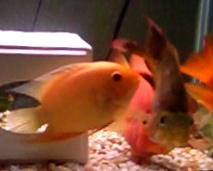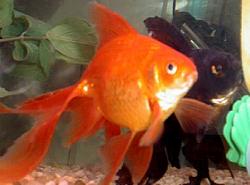Imitation Behavior in Fish
One of the more amazing characteristics of fish is their ability to learn by imitation. I’ve noticed imitative behaviors in all of my fish, including goldfish, parrot cichlids, convict cichlids, severums and oscars. Although they come out of the egg already knowing how to swim, how to eat, and how to hide, they add new behaviors as they grow.
Learning attitude: Parrot Cichlids
When young parrot cichlids are put in a tank by themselves, they will usually remain shy for weeks or months. They will hide behind anything they can. If there is nowhere else to hide, they will hover at the top corner of the tank tipping downward slightly, pretending to be part of the filter. However, if they are put into a tank with adult parrot cichlids who have no fear of humans, they get over their shyness very quickly! When we got one of our younger parrots, “Baby,” she immediately adopted the oldest parrot cichlid Winston (a female) as her “mother.” She would follow Winston around, and generally imitate everything she did, and as a result showed very little fear of us.
But most of our newly acquired parrot cichlids spend at least a day or two hiding, during which they peek out from a secure spot to observe what’s going on in the tank.
When we got “Tonkie,” “Twinkie” and “Micro,” as tiny fry, you could actually see them watching the older fish eating from our hands. Within a few days, they were right up front also, jockeying for position to get the best flakes. They will often push at my fingers if I don’t feed them fast enough, as if to say “turn on the flakes!”
Learning feeding behaviors: Parrot Cichlids
 “Tonkie” figured out a pretty good feeding spot all for himself: he eats the flakes that collect on the intake. After I feed them, there’s usually a nice selection held there by the suction, and he can pick them off at his leisure. He’s quite conscientious about his job: there are 3 intakes in the tank which he cleans daily. Tonkie is too fat to get behind the intakes, but he cleans the fronts thoroughly. Everyone else in the tank leaves him alone: as far as they are concerned, he can have the intakes. Or at least that was the case, until we introduced “Opal,” a gold severum, into the tank. After a few days of watching Tonkie, Opal had learned to eat off the intakes, and what is more, she could eat off the BACKS of the intakes, because she is thinner. At first, there were many disputes between Opal and Twinkie over the intakes, but now they have learned to share, most of the time.
“Tonkie” figured out a pretty good feeding spot all for himself: he eats the flakes that collect on the intake. After I feed them, there’s usually a nice selection held there by the suction, and he can pick them off at his leisure. He’s quite conscientious about his job: there are 3 intakes in the tank which he cleans daily. Tonkie is too fat to get behind the intakes, but he cleans the fronts thoroughly. Everyone else in the tank leaves him alone: as far as they are concerned, he can have the intakes. Or at least that was the case, until we introduced “Opal,” a gold severum, into the tank. After a few days of watching Tonkie, Opal had learned to eat off the intakes, and what is more, she could eat off the BACKS of the intakes, because she is thinner. At first, there were many disputes between Opal and Twinkie over the intakes, but now they have learned to share, most of the time.
Learning feeding behaviors: Goldfish
 Goldfish also learn by imitation, despite the fact that they think very differently than cichlids. I call them “non-linear thinkers” because they seem to forget where they are going every few seconds then pick up the thread again. This results in a meandering path. Our goldfish eventually arrive at a goal, but not without stops and distractions along the way.
Goldfish also learn by imitation, despite the fact that they think very differently than cichlids. I call them “non-linear thinkers” because they seem to forget where they are going every few seconds then pick up the thread again. This results in a meandering path. Our goldfish eventually arrive at a goal, but not without stops and distractions along the way.
Yet goldfish definitely learn new behaviors from each other. When we first got “Piggum,” a little fantail goldfish, he would eat only off the surface of the water. He would paddle back and forth across the tank all day long, never showing any interest in the gravel. After Piggum was settled in, we found “Magoo,” a telescope-eye moor. When we dropped Magoo into the tank, Piggum didn’t know what to do. He put his head down on the ground and just sat there for a long time. Piggum doesn’t have much overhead for coping with change.
But Magoo didn’t seem to mind Piggum at all! He immediately got to work checking the gravel for food. Magoo had a real work-ethic. He would systematically go over the entire tank, turning over every piece of gravel. Piggum watched him for a long time. After a few days, HE started checking the gravel also! After that, they would do it together.
As they got older, and Magoo could actually fit several pieces of gravel into his mouth, he learned to use them as “teeth” to chew his food. Lagging behind by several months, Piggum eventually picked up that behavior also, but never using gravel to the degree Magoo did.
Learning to get along
Recently we got a tiny new parrot cichlid, “Taz.” Taz is named because she is obviously cut out to be trouble! She is a King Kong parrot, which can mean a much more aggressive personality, with the ability to bite (many parrot cichlids can’t), and not afraid to use it. When Taz got into the new tank she started out hiding, as most of them do. She was quite scared of us, and had been traumatized by an experience with an oscar. It was an inauspicious beginning. She would startle at the least noise, and race into her log.
Soon however, Taz began poking her head out to defend her tiny territory. She would run up to other fish aggressively, trying to intimidate them. She did all the things convict cichlids do, both defensive and offensive behaviors, against fish many times her size. Her little mouth works very well, and we were afraid there would eventually be nipped fins and tails.
But as time went on, we would see her watching the others. The bigger parrot cichlids don’t fight too much, and when fights do break out, another fish usually busts it up after a few minutes. Sometimes we would see Taz stop in mid-bad-behavior to watch what the others were doing. It’s been a few months, and she has mostly stopped fighting, and joined the community. She also shows no more fear of us, although she still startles easily, but she always returns immediately back to the front of the tank. We often see her watching the older fish.
I always find it fascinating to watch our fish learn new behaviors. They are more intelligent than usually given credit for, but it is harder to see what they are doing than with a dog or cat, and so it is difficult to notice when they make a tiny “leap” from one concept to another. But the leaps are definitely there – and worth the effort to see.
This is so true, I notice the same things happened to my goldfishes.
—–